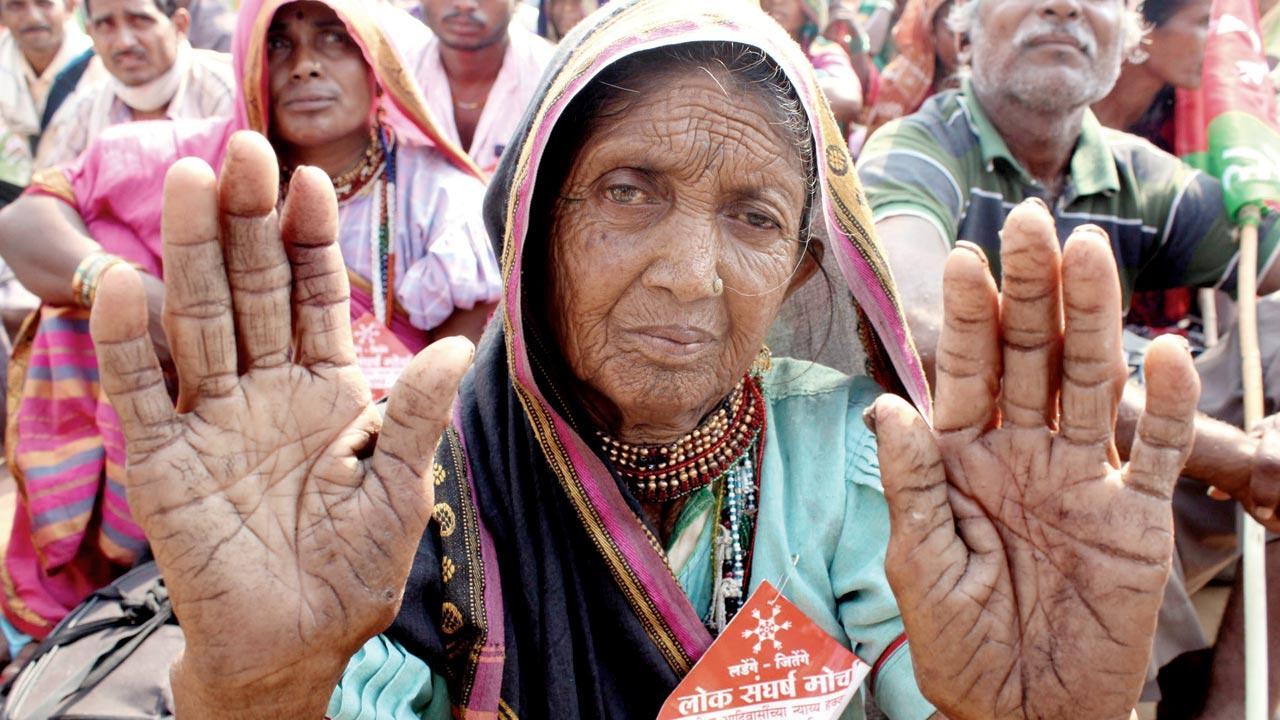A former IAS officer dips into her 35-year-long career for a book that starts as a fictional account but ends with November 2018’s mammoth farmers’ protest from Nashik to Mumbai

More than 5,000 farmers and tribals marched towards Azad Maidan to demand a loan waiver for farmers, drought compensation to all affected districts in the state and transfer of forest rights to the tribals, on Nov 22, 2018 in Mumbai. Pic/Getty Images
A cowbell rang out. But it wasn’t any of these that had woken Terna up; it was a different reason, it was the fear that always raced across the minds of young women at night here in these shanties like a jagged flash of lightning. Even with your eyes closed, you could tell if someone was staring at you.”
ADVERTISEMENT
In The Sickle (Juggernaut Books), Bengali writer Anita Agnihotri speaks directly about the plight of migrant workers in Maharashtra. The book, originally published in Bengali as Kasté, and later translated in English by Arunava Sinha, takes a deep dive into the lives of farmers, migrant labourers and activists in Marathwada and western Maharashtra who are grappling with a range of crises—infanticide, sexual assault, casteism, feudal labour relations, farmers’ suicides and climate change.
Even though the book took shape in Agnihotri’s head over a two-year period starting in 2017, she has been familiar with the Marathwada and Vidarbha areas for over a decade, because of her career as IAS officer.
Retired IAS officer Anita Agnihotri’s first-hand experience of seeing farmers’ struggle with government policy, drought and cast bias inspired The Sickle. Pic/Atul Kamble
“When I first visited Marathwada in 2012, the most-talked about issue was the low sex ratio and female infanticide. I was part of the National Commission for Women team that had been dispatched to the region to talk to children and their parents. Before this stint, I was posted in Mumbai and in charge of the special economic zone for the western region of the country. Back then, I had visited Satara, Nanded and Buldhana. During these trips, I tried to understand how people lived in these villages.
So, when I started writing The Sickle, the main goal was to highlight the insecurities of migrant women workers, the concerns of the girl child, and of course,
farmers’ suicide.”
She knew she had to emphasise the problem of drought in the book after having seen the consequences of climatic tyranny first-hand. “My husband’s family lives in Jalgaon, and my sister-in-law lives in Manmad. Back in the early 1980s, her family used to get water supply only once every fortnight. It was shocking to me, because I had lived where water was plentiful. In the next few years, we witnessed how powerful a business tool the water tanker is. It goes to places where the affluent stay, and the remaining have to queue up for hours,” remembers Agnihotri, whose first writing stint was as a school student writing for renowned filmmaker Satyajit Ray’s children’s magazine Sandesh.
While The Sickle begins as a fictional account, it ends in real time when Mumbai wakes up to disturbing photos of thousands of farmers walking hundreds of kilometres from Nashik to Azad Maidan, as it actually happened in November 2018. “In the Bengali version of the book, there is a long prelude, which talks about how more and more areas in the country are becoming drought-prone. There is a thin line between reality and fiction. While my characters are fictional, their problems are real. I had to put the 2018 Kisan Long March at the end of the book, or the stories would have felt incomplete,” adds Agnihotri, who retired as Secretary to the Government of India in 2016.
Agnihotri thinks her novel has launched at the right time, when India is witnessing another farmers’ protest, this time on Delhi’s borders. “I had visited Surgana subdivision in Nashik, where the 2018 march had begun. Small local protests resulted in the longer and wider march that November. Things are repeating themselves. I believe it is unfair that the government did not bother to consult farmer groups before introducing the controversial Farm Bills. So while the two protests took place for different reasons, my common concern is—why do farmers have to protest at all? Have you seen an industrialist walk kilometres to get his demands heard? Our country needs to respect agriculturists. And that’s the message of this book.”
 Subscribe today by clicking the link and stay updated with the latest news!" Click here!
Subscribe today by clicking the link and stay updated with the latest news!" Click here!






